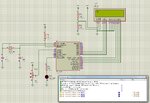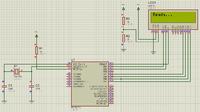nagkiller
Full Member level 4
Hello!!!
I need help in CCS compiler (V4.140), the PIC16F76 cannot run lcd in ISIS PROTEUS (V7.10)...
I trying the example created by the Project Wizard.
This is the log
"
"
Thanks.
Sorry for bad english.
I need help in CCS compiler (V4.140), the PIC16F76 cannot run lcd in ISIS PROTEUS (V7.10)...
I trying the example created by the Project Wizard.
This is the log
"
Message Source Time
ISIS Release 7.10.00 (Build 12325) (C) Labcenter Electronics 1990- 2011.
Source code build completed OK.
Compiling design 'C:\Program Files\PICC\Projetos\PIC16F76\Outro\Teste LCD.DSN'.
Netlist compilation completed OK.
Netlist linking completed OK.
Partition analysis completed OK.
Simulating partition [77F7A989]
PROSPICE 7.10.00 (Build 11592) (C) Labcenter Electronics 1993-2011.
Loaded netlist 'C:\Users\xxxxx\AppData\Local\Temp\LISA0013.SDF' for design 'C:\Program Files\PICC\Projetos\PIC16F76\Outro\Teste LCD.DSN'
PIC16 model release 7.10.00 (Build 12500) simulating PIC1676 device. U1
[COFF] Loading PIC COFF file 'Outro.COF'. U1
END Of BOOTING U1
Loaded 356 program words and 0 data bytes. U1
Logic contention(s) detected on net #00003.
Logic contention(s) detected on net #00002.
Logic contention(s) detected on net #00001.
[PIC16 MEMORY] PC=0x015F. Attempt to write unimplemented memory location 0x010D with 0x0C ignored. U1
[PIC16 MEMORY] PC=0x0161. Attempt to write unimplemented memory location 0x010F with 0x00 ignored. U1
[PIC16 MEMORY] PC=0x00F5. Attempt to read unimplemented memory location 0x018C ignored. U1
[PIC16 MEMORY] PC=0x00F5. Attempt to write unimplemented memory location 0x018C with 0x80 ignored. U1
[PIC16 MEMORY] PC=0x00F6. Attempt to read unimplemented memory location 0x018C ignored. U1
[PIC16 MEMORY] PC=0x00F6. Attempt to write unimplemented memory location 0x018C with 0x01 ignored. U1
[PIC16 MEMORY] PC=0x00FA. Attempt to read unimplemented memory location 0x010C ignored. U1
"
Thanks.
Sorry for bad english.

